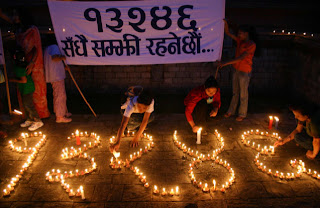 |
| Memorial event of a candlelight at the Mandala organise by the citizens's peace group Himsa Birodh. Photo: RP Humagai |
Washington: The United Nations human rights chief on Monday highlighted her
concern over Nepali Government’s failure to create promised transitional
justice mechanisms to address past human rights violations in the country.
United Nations’s Human Rights Commission on Monday released a landmark report on
breaches of international law committed in the ten years before the 2006 peace
deal between the Nepali Government and the Communist Party of Nepal (Maoist).
In the introduction to the ‘Nepal
Conflict Report (released report), the UN High Commissioner for
Human Rights, Navi Pillay, notes that, in signing the 2006 Comprehensive Peace
Agreement, the two sides had committed to “establishing the truth about the
conduct of the conflict and ensuring that the victims… receive both justice and
reparations.”
Six years later, the steps to deliver justice in the peace accords have
still not been established, according to the High Commissioner, “and successive
governments have withdrawn cases that were before the courts. Perpetrators of
serious violations on both sides have not been held accountable, in some cases
have been promoted, and may now even be offered an amnesty.”
In her introduction, Ms. Pillay states she is offering the report and
archive “to the Government and people of Nepal, to assist them in their
essential task of building a sustainable foundation for peace.”
“The Report is
intended to act as an initial compilation of credible allegations of serious
violations of international law,” she notes. “The allegations are presented in
the context of relevant laws and evidence, to provide the basis for further
investigation and prosecution by a Nepali judicial process.”
According to OHCHR, accountability and impunity issues came into sharp
focus last week, when it was revealed that the Government of Nepal had decided
to promote Colonel Raju Basnet to the rank of Brigadier General – despite
repeated reminders from OHCHR, the National Human Rights Commission of Nepal
and others, that a battalion under the command of Colonel Basnet was heavily
implicated in the alleged arbitrary detention, torture and disappearance of
individuals said to have taken place at the Maharajgunj Barracks in 2003-04.
Similar concerns have been expressed about the recent appointment of
Kuber Singh Rana as Inspector General of the Nepal Police. OHCHR notes that he
has been accused of serious human rights violations during the conflict.
The Nepal Conflict Report states that the conflict in
the Himalayan country left 13,000 people dead, while another 1,300 remain
missing. It also notes the death toll may have been higher, with Government
figures now citing 17,000 killed.
Much of the documentation in the Transitional Justice Reference
Archive was collected in the course of work carried out in Nepal by
OHCHR, which operated a field office in the country from 2005 to 2012, under a
mandate to observe human rights under the Comprehensive Peace Agreement.
The
Government of Nepal did not renew OHCHR’s mandate in December 2011 and asked
the UN agency to wrap up its operations there. “Accountability therefore
remains a matter of fundamental importance to Nepal as it deals with its legacy
of conflict,” the agency adds.


